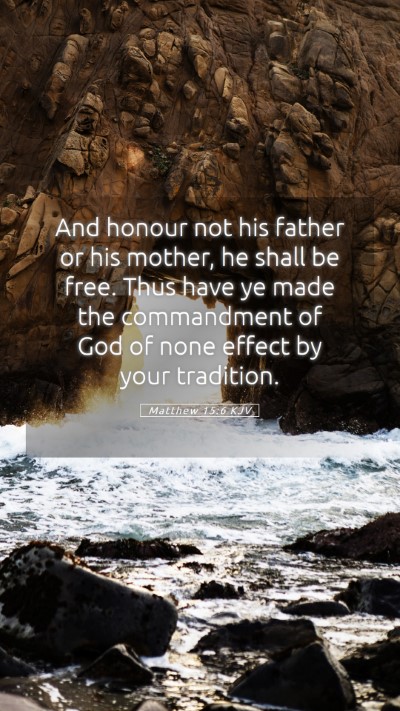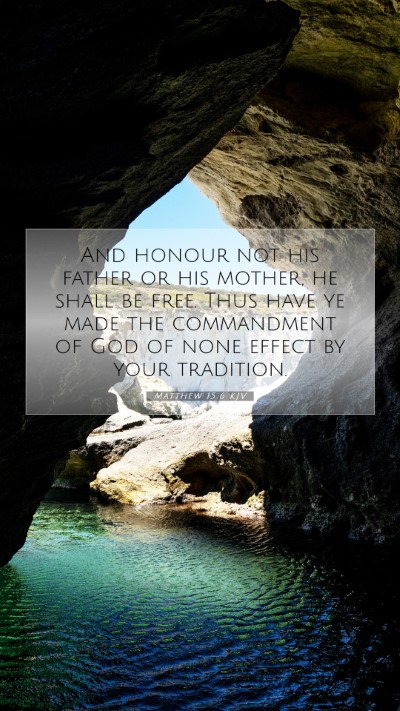Bible Verse Meaning and Commentary on Matthew 15:6
Matthew 15:6 states: "And honor not his father or his mother, he shall be free. Thus have ye made the commandment of God of none effect by your tradition." This verse addresses the conflict between divine commandments and human traditions, positioning the latter as a serious issue within religious practice.
Overview of the Verse
In this passage, Jesus criticizes the Pharisees for allowing their traditions to undermine God's commandments. Specifically, this critique targets those who manipulate religious laws to excuse their failure to honor their parents, which is a fundamental commandment.
Commentary Insights
- Matthew Henry's Commentary:
Henry emphasizes that Christ here argues against the Pharisees' strict adherence to traditions that violate the moral law of God. He highlights the hypocrisy of those who preach obedience to the law while dismissing their obligations, particularly in familial responsibilities.
- Albert Barnes' Notes:
Barnes explains that this criticism illustrates how Jewish tradition allowed some to escape their moral responsibilities. He points out the danger in developing traditions that supersede God's commands, leading people astray from their duties.
- Adam Clarke's Commentary:
Clarke's interpretation reflects on the cultural context where certain teachings deviated from God’s intent, emphasizing the importance of adhering to the spirit of the law rather than just the letter of it. He warns of the dangers of interpreting the law to suit personal gain.
Theological Implications
This verse brings forth significant theological implications surrounding the authority of God's word versus human interpretations. It raises questions about practical religion and the authenticity of one's faith when it bends to human traditions.
Application in Daily Life
Understanding Matthew 15:6 invites believers to reflect critically on how traditions can sometimes distort genuine faith practices. It encourages individuals to prioritize God's commandments in their lives and apply these teachings to maintain integrity in their familial and social responsibilities.
Cross References
This verse relates to several other scriptural passages:
- Exodus 20:12: "Honor thy father and thy mother: that thy days may be long upon the land which the Lord thy God giveth thee."
- Mark 7:9: "And he said unto them, Full well ye reject the commandment of God, that ye may keep your own tradition."
- Colossians 2:8: "Beware lest any man spoil you through philosophy and vain deceit, after the tradition of men, after the rudiments of the world, and not after Christ."
Conclusion
Matthew 15:6 serves as a pertinent reminder of the importance of aligning religious practice with divine commandments rather than human traditions. This understanding is crucial for any believer seeking Bible verse meanings, Bible verse interpretations, and deeper Bible study insights. By analyzing this scripture, individuals can gain a profound understanding of the significant conflict between tradition and biblical truth, ultimately drawing closer to the essence of their faith.


